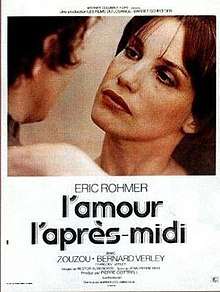Love in the Afternoon (1972 film)
Love in the Afternoon (original title: L'Amour l'après-midi and released in North America as Chloe in the Afternoon) is a 1972 French film by Éric Rohmer. It is the sixth and final movie in Rohmer's "Six Moral Tales" series.
| Chloé in the Afternoon | |
|---|---|
 Film poster | |
| Directed by | Éric Rohmer |
| Produced by | Pierre Cottrell Barbet Schroeder |
| Written by | Éric Rohmer |
| Starring | Bernard Verley Zouzou Françoise Verley Daniel Ceccaldi |
| Cinematography | Néstor Almendros |
| Edited by | Cécile Decugis |
| Distributed by | Columbia Pictures (US) |
Release date | September 29, 1972 (U.S.) |
Running time | 97 minutes |
| Country | France |
| Language | French |
| Box office | $6,766,342[1] |
An English-language remake starring Chris Rock, titled I Think I Love My Wife, was released in 2007. Neither film is a remake or derivative of Love in the Afternoon, a 1957 romantic comedy directed by Billy Wilder.
Plot
Frédéric (Bernard Verley), the young and successful partner in a business, is happily married to Hélène (Françoise Verley), an English teacher, and father to one child with another on the way. Still, something eats away at him. While going through his day, Frédéric begins to ponder the times before he was married, when he was free to be with any woman he wanted and could feel the deep satisfaction of anticipation while he chased them. At one point in the film, he has an elaborate fantasy where he possesses a magical amulet that causes all women to bow to his will (the sequence features actresses from previous "Moral Tales"). These thoughts do not distress Frédéric though, as he sees these ideas as a reflection of how true his love to his wife is.
One day, a woman from Frédéric's past appears at his office, hungry and homeless. Chloé (Zouzou) had once been the girlfriend of an old friend of Frédéric's, and had caused this friend a great deal of grief. At first Frédéric believes Chloé only wants cash and company, but over time, as she tries a series of jobs to attempt some type of solidity in her life, to the increasing amusement of the secretaries in Frédéric's office the two begin spending afternoons together, talking of many things Frédéric finds himself unable to talk to his wife about. He enjoys the pleasures of an attractive mistress without the guilt of adultery, while she has a man who will do whatever she wants without needing sex.
But it cannot last. After the birth of Frédéric's second child, Chloé decides she too needs a child to give focus to her aimless existence and, while she has no desire to be tied in marriage, that Frédéric must be the father. He ponders whether to stay with the faithful wife he loves greatly or whether to launch into the unknown with a woman for whom he feels a strange deep passion. A decision is precipitated when Chloé summons him to her latest address and, when he arrives, she is in the bath. Emerging, she invites him to towel her dry all over, which he does, and then calls him to her bed. Leaving her naked and waiting, he scampers out of the apartment and down the flights of stairs to safety, like a frightened boy going home to Hélène. The tears that spill from her eyes show that something definite yet not altogether dire has changed between the two of them.
Cast
- Bernard Verley as Frédéric Carrelet, a married businessman
- Françoise Verley as Hélène Carrelet, the English teacher wife of Frédéric (also his real-life wife)
- Zouzou as Chloé, Frédéric’s temptress
- Daniel Ceccaldi as Gérard, Frédéric's business partner
- Malvina Penne as Fabienne, one of Frédéric and Gérard's secretaries
- Babette Ferrier as Martine, Frédéric and Gérard's other secretary
- Frédérique Hender as Mrs. M., a guest of the Carrelet's
- Claude-Jean Philippe as Mr. M., a guest of the Carrelet's
- Suze Randall as the English au pair
- Claude Bertrand as the student
- Françoise Fabian as a woman during the dream sequence (from My Night at Maud’s)
- Marie-Christine Barrault as a woman during the dream sequence (from My Night at Maud’s)
- Haydée Politoff as a woman during the dream sequence (from La Collectionneuse (The Collector))
- Aurora Cornu as a woman during the dream sequence (from Claire's Knee)
- Béatrice Romand as a woman during the dream sequence (from Claire's Knee)
In popular culture
American singer-songwriter St. Vincent named the opening song of her third studio album, Strange Mercy, "Chloe in the Afternoon".
References
- JP. "L\'Amour l\'après-midi (1972) - JPBox-Office". www.jpbox-office.com.
External links
- Love in the Afternoon on IMDb
- Love in the Afternoon at Rotten Tomatoes
- Love in the Afternoon at AllMovie
- Howard Schumann, "Six Moral Tales"
- Love in the Afternoon: Marriage, Rohmer-Style an essay by Armond White at the Criterion Collection